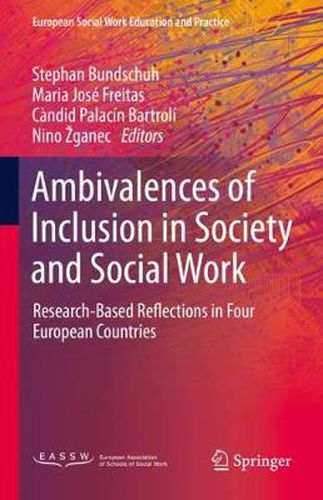Readings Newsletter
Become a Readings Member to make your shopping experience even easier.
Sign in or sign up for free!
You’re not far away from qualifying for FREE standard shipping within Australia
You’ve qualified for FREE standard shipping within Australia
The cart is loading…






This title is printed to order. This book may have been self-published. If so, we cannot guarantee the quality of the content. In the main most books will have gone through the editing process however some may not. We therefore suggest that you be aware of this before ordering this book. If in doubt check either the author or publisher’s details as we are unable to accept any returns unless they are faulty. Please contact us if you have any questions.
This book represents the work of the European Research Network: Inclusive Society and the Role of Social Work, which comprises researchers from Barcelona, Spain; Koblenz, Germany; Maastricht, The Netherlands; and Zagreb, Croatia. The authors present research results and reflections from these four different European countries to provide a comprehensive introduction and discussion of the ambivalences of inclusive processes in society and social work.
The development towards an inclusive society is a subject of ongoing discussion in Europe. How the subject is addressed, through an examination of political and social characteristics, differs significantly by country. Each country-specific chapter includes evidence-based reflections on inclusive society and the role of social work:
In The Netherlands, there is
evidence of a top-down process implementing inclusive social policy and
social work principles through the self-proclaimed ‘participation
society’. In Spain, the process to
inclusion is accompanied by the third sector often replacing governmental responsibilities,
namely through the bottom-up activities of non-governmental organizations
in social work. In Croatia, inclusion is a
state initiative in transitioning society and an academic approach to deinstitutionalising
social work. In Germany, inclusion
is discussed in social systems theory and the reform of school systems. In
the migration discourse it was introduced as a less-loaded alternative to integration.
Ambivalences of Inclusion in Society and Social Work: Research-Based Reflections in Four European Countries is a useful resource for learners, teachers, practitioners, and researchers in social work, as well as those who have an interest in social policy, social welfare, and sociology.
$9.00 standard shipping within Australia
FREE standard shipping within Australia for orders over $100.00
Express & International shipping calculated at checkout
This title is printed to order. This book may have been self-published. If so, we cannot guarantee the quality of the content. In the main most books will have gone through the editing process however some may not. We therefore suggest that you be aware of this before ordering this book. If in doubt check either the author or publisher’s details as we are unable to accept any returns unless they are faulty. Please contact us if you have any questions.
This book represents the work of the European Research Network: Inclusive Society and the Role of Social Work, which comprises researchers from Barcelona, Spain; Koblenz, Germany; Maastricht, The Netherlands; and Zagreb, Croatia. The authors present research results and reflections from these four different European countries to provide a comprehensive introduction and discussion of the ambivalences of inclusive processes in society and social work.
The development towards an inclusive society is a subject of ongoing discussion in Europe. How the subject is addressed, through an examination of political and social characteristics, differs significantly by country. Each country-specific chapter includes evidence-based reflections on inclusive society and the role of social work:
In The Netherlands, there is
evidence of a top-down process implementing inclusive social policy and
social work principles through the self-proclaimed ‘participation
society’. In Spain, the process to
inclusion is accompanied by the third sector often replacing governmental responsibilities,
namely through the bottom-up activities of non-governmental organizations
in social work. In Croatia, inclusion is a
state initiative in transitioning society and an academic approach to deinstitutionalising
social work. In Germany, inclusion
is discussed in social systems theory and the reform of school systems. In
the migration discourse it was introduced as a less-loaded alternative to integration.
Ambivalences of Inclusion in Society and Social Work: Research-Based Reflections in Four European Countries is a useful resource for learners, teachers, practitioners, and researchers in social work, as well as those who have an interest in social policy, social welfare, and sociology.